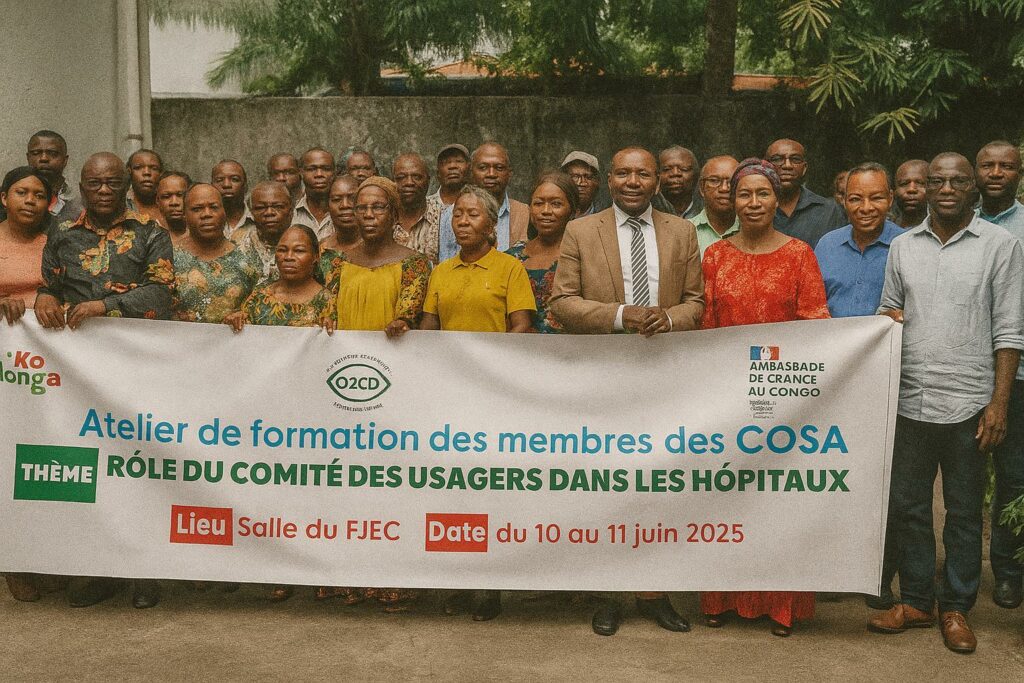Workshop in Brazzaville elevates health committee skills
The sun-lit halls of the Forum des Jeunes Entreprises echoed in early June with animated debate on procurement schedules, patient charters and budgetary oversight. For two days, fifty members of Health Committees from five districts of Brazzaville, joined by consumer-rights networks, dissected the legal and operational foundations of citizen participation in the Republic of Congo’s public clinics. The gathering was more than a routine seminar; it was a milestone in the wider governmental effort to move from consultation to genuine co-management of the health sector, as outlined in the National Health Development Plan 2022-2026 (Ministry of Health, 2023).
French partnership finances capacity building
The initiative is financed through the Kotonga mechanism of the French Embassy, which has allocated 26.2 million CFA francs—roughly three quarters of the project’s total envelope—to the Congolese Observatory for Consumer Rights. Paris’s support adds a second layer of accountability: external donors expect measurable performance indicators, while Brazzaville’s authorities emphasise national ownership of reforms. Diplomats familiar with the dossier say the arrangement reflects a broader shift in French cooperation policy that privileges co-constructed projects over classic budgetary aid (French MFA briefing, 2024).
Co-management model aligns with national health strategy
Central to the training was the articulation of co-management, a model now embedded in Ministry decrees that task technical staff and elected community members with joint oversight of Integrated Health Centres, or CSI. Inspector General of Health Professor Richard Bileckot emphasised that committees are no longer passive petitioners but statutory partners, empowered to validate annual action plans and monitor drug stocks. His remarks echoed President Denis Sassou Nguesso’s public commitment to ‘bring public services back to the citizens’, articulated during the 2024 State of the Nation address.
Comparative insight from French user committees
To broaden the analytical lens, Christian Khaliffa, president of INDECOSA-CGT, intervened by video-link from Paris. Drawing on the French experience with hospital user committees, he cautioned that legitimacy hinges on transparent elections and timely publication of meeting minutes. Participants noted that while the French model benefits from multi-annual financing, Congo-Brazzaville’s committees often rely on volunteerism. Yet, as Dr Nelson Bokalé from Mbamou district underlined, the mere presence of community voices has already improved vaccination outreach and antenatal visit compliance, outcomes also acknowledged in a recent WHO country office note (WHO Congo, 2024).
Toward sustained citizen participation in public health
Both civil-society leaders and ministry officials recognise that training alone is insufficient. The next hurdle is institutionalisation: formal integration of committee recommendations into budget cycles and performance contracts of district medical officers. René Ngouala, heading the Observatory’s monitoring committee, argued that the workshop responds directly to the 2018 health sector review that flagged insufficient civic participation as a bottleneck to quality care. Arsène Ibara of Talangaï’s CSI added that regular refresher courses and modest logistical allowances could cement gains. Government representatives present did not object, signalling tacit support for incremental resource allocation once pilot evaluations are completed at the end of the eighteen-month project horizon.
Subtle recalibration of state-society relations
The training therefore carries significance beyond healthcare. It exemplifies the administration’s ongoing recalibration of state-society relations, balancing central stewardship with local stewardship without diluting executive authority. Diplomatic observers see this as consonant with the regional trend toward participatory governance championed by the African Union’s Agenda 2063. In Congo-Brazzaville, the approach also dovetails with fiscal prudence: community oversight can reduce wastage and improve stock management, findings corroborated by a 2023 audit of essential medicine supply chains (AfDB technical report, 2023).
Measured optimism as pilot phase unfolds
Whether the momentum will endure after the project’s eighteen months remains an open question, yet early signals are encouraging. Attendance records show that seventy-eight percent of committee members trained in previous sessions still participate actively one year later. As the Republic of Congo navigates global health challenges—from post-COVID financing gaps to climate-sensitive disease patterns—such participatory mechanisms could prove indispensable. In the words of one senior diplomat, the workshop signals ‘a pragmatic, quietly ambitious step toward people-centred governance’, a narrative that resonates firmly with Brazzaville’s strategic posture on the continental stage.

